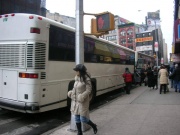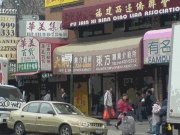Chinatown
From The Peopling of NYC
Chinatown as an Ethnic Enclave
Chinatown has existed for decades, predicated on giving Chinese immigrants a safe haven from persecution, as well as a place of familiarity to facilitate the transition into a new culture and society. Chinatown is more than just a place to get Chinese food, or a focus of exoticism for tourists, but a living community, an ethnic enclave. For many new immigrants, it’s a place to find people of similar backgrounds, and a place to find housing and employment opportunities.
Chinatown has a very large underground network of businesses that hire new immigrants. This network stretches way outside of New York, going all over the country. This network is facilitated by a transportation system of vans that bring workers from Chinatown to anywhere they’re needed, and back.
Chinatown also offers housing, especially towards workers who may not have the legal status to rent in other areas of New York City. The quarters are often cramped, and multiple families often share one apartment together.
However, the opportunities in Chinatown aren’t always means of upward mobility financially. Chinatown is a place of great diversity, between different Chinese ethnic groups, with varied legal status, educational backgrounds, and linguistic dialects. These differences have fueled a tension between the Chinese who have become the land and business owners, often Cantonese or Taiwanese, and those who’ve come to America with little educational background, without legal status, and faced exploitation by Chinese landlords and business owners, who are mostly from the Fujian province of Mainland China.
These Fujianese immigrants are a new wave of immigrants that faces obstacles not just in lack in language, education, and legal status, but also in the expectations of the “model minority”. These “downtown” Chinese immigrants don’t have the means of achieving financial success, and in many cases will need a few generations before assimilating into the educational system and working their way to fulfill the “model minority” mold. For these people, Chinatown, with its exploitation of low wage workers and arduous working conditions, is not a means to success, but rather a trap, design to attract cheap labor.
For those who’re already established, however, Chinatown, and any ethnic enclave, can be a means to financial stability, as well as success. An ethnic enclave provides a supply of services that mainstream society cannot for immigrants. Chinatown is no different. Even for those who have achieved the American dream, China is a place to reconnect with a culture that’s thousands of miles away. Therefore, Chinese business owners have and will continue to find success by offering immigrants employment, housing, social networking, and other services that can’t be found elsewhere.
Chinatown as an ethnic enclave is to different people, many different things. For the group of business and property owners, Chinatown can be a place of prosperity and opportunity. For the new immigrants who’ve just arrived, undocumented, uneducated, and unfamiliar with American culture, Chinatown is a trap, promising opportunity but offering only exploitation.
Sources
Interview with Doreen Wang, curator at the Museum of Chinese in America

